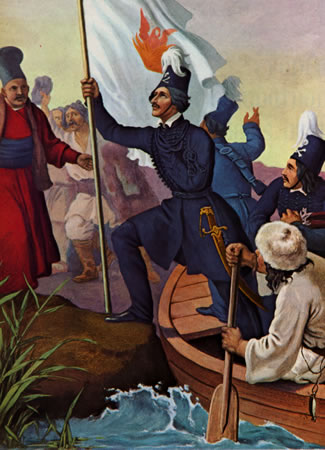christos200
Never tell me the odds
Theodoros Kolokotronis


This article deals with Theodoros Kolokotronis, the famous Greek General, whose victories solidified the Greek Revolution of 1821 against the Turkish Ottoman Empire. Instead of writing about the entire life of this great man, which would take whole books, I will instead translate to English some of his writings and letters, and also some writings of people who knew him. Before each translation, I will give some of information about what the writing has to do about. In the translation, I may have a note inside a [] to make the writing more understandable. At the end of the article, I have writen my sources. I hope that you will find interesting this article.

In the British Army:
Theodoros Kolokotronis was born in 3 April 1770 in the Peloponnese. He was a Klepht, and for this reason, the Ottoman hunted him, and in May 1806, Kolokotronis was forced to leave for Zakynthos. At that time, the Ionian Islands were a Russian puppet state. But after Russia's defeat by Napoleon in 1807, the French took over the Ionian Islands, which became a battlefield between the British and the Napoleon's Imperial French. Kolokotronis was a Major in the British Army, which recruited Greeks. Kolokotronis took part in the takeover of Lefkada, which took place in 1810. The first of the writing I will present here is from Kolokotronis' autobiography. The British General Osvald wanted to make a night landing in Lefkada, which Kolokotronis objected:
"General, we should not make a landing [in the night], because we are from many places and we do not know each other and we could kill each other [by accident]. But, if we land in the morning, I can promise that by noon, we would taken over the country [Lefkada]." [1]
About the siege of Lefkada, Hiotis writes:
"The Greeks, encouraged by their first victories, marched against them [the French Fort]. But, when the French cannons fired from the Fort, Kolokotronis shouted 'Get down, dogs!!'. So, the cannon fire found the British and Corsicans who were marching behind [the Greeks], causing much death. The Greeks had 35 dead and injured, while the British and the Corsicans lost large numbers of men. Kolokotronis then shouted again and the Greeks run and took over the Fort." [2]
In Revolutionary Greece:
In 1817, after the defeat of Napoleon, the British had no reason to keep the Greek soldiers and so they disbanded the army in which Kolokotronis served. Kolokotronis then became member of a secret organization, the Filiki Etairia, whose goal was to free Greece from Ottoman rule. In 1821, a revolution begun in Ottoman Greece and Kolokotronis came back to the Peloponnese. There, he had to create an army from peasants, who had no experience in war and no discipline. In his autobiography, Kolokotronis writes:
"The leadership of a Greek army is a tyranny, because the Greeks came and left [from the military camp] every day, and could only be held by lies. Also, supplies were missing and the soldiers did not listen to the orders of their leaders, while in Europe the Commander in Chief orders the Generals, the Generals the colonels and so on. He [the Commander in Chief] does his plan and ends the matter. If [the Duke of] Wellington gave me 40,000 men, I could command them. But if I gave him 500 Greeks, he would not command them for more than an hour." [3]
In 1822, Dramali Pasha invaded the Peloponnese with a huge army. Kolokotronis would face Dramali in the Battle of Dervenakia ( 26–28 July 1822), his greatest military victory. Here is how Kolokotronis describes the battle in a letter he send in 6 August 1822 to the military leaders of Western Greece:
"Right now, we have them [the Turks] surrounded. This happened because when they crossed the Dervenakia, we allowed them to pass without resistance and gave them the Corinthian plain, which was barren and from which we had taken everything that could be eaten and burned the rest. Then, we also gave them the plain of Argos, which was also barren. Because they had nothing to eat, they begun to march back to Corinth. They were 15,000, most of them cavalry. I fortified in a pass which they had to cross, which had rugged terrain and was bad for their cavalry. There, I attacked them with only 800 men. Nikitaras [a Greek military commander] then, along with a few troops, closed the exit of the pass and we massacred them. We killed 2,000 men [Turks] and captured thousands of horses. We lost only two men." [4]
Those writings show the difficulties Kolokotronis had to face in revolutionary Greece and how he managed to achieve his greatest victory. I hoped that you found this article informative.
Sources:
[1]: Θ. Κολοκοτρώνης, Διήγησις, page 44.
[2]: Παν. Χιώτης, Ιστορικά Απομνημονεύματα, page 910.
[3]: Θ. Κολοκοτρώνης, Διήγησις, pages 191-192.
[4]: Δημήτρης Δημητρόπουλος, Θεόδωρος Κολοκοτρώνης, pages 49 - 50.



